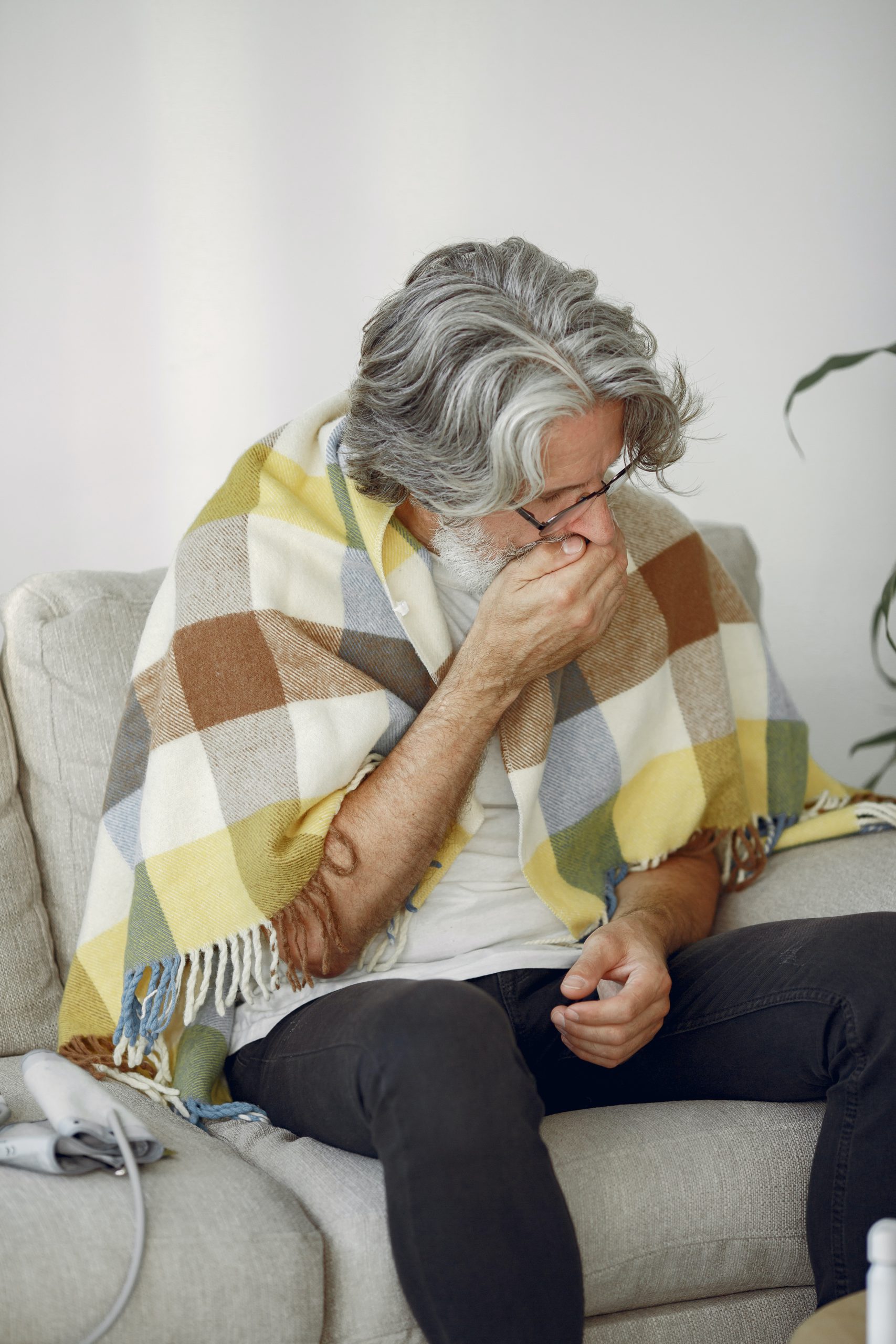Shortness of breath after eating can be caused by a variety of factors. These may include existing respiratory problems such as COPD, asthma, and allergies, as well as digestive conditions like hiatal hernia and GERD. Shortness of breath after eating can also indicate that food was accidentally inhaled into the respiratory system or be a symptom of a severe food allergy or anaphylaxis.
Symptoms of shortness of breath after eating can feel like a tightness in your chest or the sense that you are suffocating. If these symptoms are new or happen frequently, it’s important to seek medical attention. Heart, lung, or digestive issues are often the root causes of shortness of breath, but COVID-19 patients may also experience this symptom.
What is Shortness of Breath?
Shortness of breath, also known as dyspnea or breathlessness, is the feeling of not being able to breathe properly or get enough oxygen into your lungs. This can be uncomfortable or frightening, especially for individuals with preexisting respiratory or heart conditions. Sudden or severe shortness of breath should be addressed immediately by a medical professional.
There are several potential causes of shortness of breath, such as being at higher altitudes, poor physical health or obesity, overexertion, anemia, pneumonia, lung cancer, tuberculosis, COVID-19, pulmonary embolism (PE), or inhalation injuries (such as breathing in a foreign object or substance). Certain positions, such as lying down, waking up in the middle of the night, lying on your left or right side, or standing up, may also trigger shortness of breath.
Another possible trigger for shortness of breath is consuming a meal. This can be caused by a variety of factors, such as existing respiratory or digestive conditions like asthma, chronic obstructive pulmonary disease (COPD), hiatal hernia, or gastroesophageal reflux disease (GERD). In some cases, shortness of breath after eating may also be a symptom of a severe food allergy or indicate that food has been accidentally inhaled into the respiratory system.
What Does Shortness of Breath Feel Like?
The sensation of shortness of breath can be a scary experience, especially if it’s the first time you’re feeling it. Depending on the underlying cause, you may experience one or more of the following symptoms:
- Inability to take a deep breath no matter how much you try
- Rapid increase in breathing rate
- Tightness in the chest or feeling like you’re suffocating
- Swelling of the airways and lips, making it difficult to breathe
- Wheezing and grunting while trying to breathe
It’s important to note that feeling out of breath after physical activity is typically not a cause for concern, but experiencing chronic breathlessness during exercise could be a sign of shortness of breath.
Which Symptoms of Shortness of Breath Require Medical Attention?
Shortness of breath is a common symptom that can range from mild to severe. While some degree of breathlessness is normal during physical activity, there are times when it can be a sign of a medical emergency. If you experience any of the following symptoms, seek prompt medical attention:
- Your shortness of breath persists even after resting for 30 minutes.
- Your breathing becomes increasingly difficult or labored.
- You experience chest pain or pressure along with shortness of breath, which could indicate a collapsed lung or heart attack.
- Your lips and skin turn blue or gray, which suggests a lack of oxygen in your blood.
- You feel dizzy, lightheaded, or faint.
- You experience confusion, disorientation, or altered mental status.
- You feel nauseous or vomit.
- Your shortness of breath comes on suddenly and severely.

Common Reasons:
Heartburn
Individuals who experience heartburn may also encounter shortness of breath or wheezing during or after a meal, caused by stomach acid rising back up into the throat. The harsh burning sensation that occurs after eating may be accompanied by wheezing or difficulty breathing. Heartburn is primarily caused by a weak lower esophageal sphincter (LES), which is a group of muscles that function as a valve to prevent stomach contents from refluxing back into the esophagus and upper airways. When the LES isn’t functioning correctly, stomach acid can flow in the wrong direction, leading to heartburn.
Frequent heartburn can lead to gastroesophageal reflux disease (GERD), which may cause a sensation of having something stuck in the throat. In addition to breathing difficulties, less common symptoms of GERD include coughing, a hoarse voice, or hiccups.
Several lifestyle changes can help decrease the frequency of heartburn episodes, including weight loss, avoiding alcohol, and not smoking. Limiting exposure to foods that can cause heartburn, such as fried or spicy foods, may also be beneficial.
COPD
COPD is a lung condition that is progressive and irreversible. One of the primary causes of COPD is smoking or exposure to smoke. As time goes by, the damage to the airways and lungs makes it difficult for air to move in and out, leading to difficulty breathing, chest tightness, and a chronic cough.
Individuals with COPD may feel short of breath after a meal due to the pressure that large meals place on the diaphragm and lungs. Additionally, larger meals take more energy to digest, which can compound the fatigue that COPD sufferers already experience.
To help alleviate this symptom, eating smaller, more frequent meals can be helpful. It is also recommended to make dietary changes, such as reducing salt intake, which can lead to fluid retention and worsened breathing.
It’s crucial for individuals with COPD who use supplemental oxygen to continue using it while eating.
Anaphylaxis
Anaphylaxis is a potentially life-threatening allergic reaction that can occur within minutes after exposure to an allergen, such as certain foods like shellfish, milk, eggs, peanuts, and tree nuts. Shortness of breath after eating may be the first symptom in some cases.
While hives and swelling of the lips and airway are common symptoms of anaphylaxis, some individuals may experience breathing difficulties without these accompanying symptoms. This can be similar to an asthma attack and may include symptoms such as wheezing and coughing.
It’s important to seek immediate medical attention if you experience any symptoms of anaphylaxis, including shortness of breath, after eating a food you may be allergic to. Epinephrine, which can be administered through an auto-injector, is the first-line treatment for anaphylaxis and can be life-saving.
GERD-Related Asthma
GERD and asthma are often seen together, with each condition worsening the other. Stomach acid that washes up into the airway can irritate the tissues and trigger an asthma attack. In turn, asthma can cause the lower esophageal sphincter to relax, which allows stomach acid to rise into the throat.
Making changes to your diet, such as avoiding acidic foods and beverages like coffee and tomatoes, and eating smaller meals earlier in the evening may help relieve symptoms. Your healthcare provider may also recommend medications such as famotidine (Pepcid AC) or omeprazole (Prilosec) to manage GERD symptoms.
Inhaling Food
Accidentally inhaling food or drink can cause shortness of breath during or immediately after. This is known as airway aspiration, which occurs when food, drinks, or saliva enter the trachea or another part of the respiratory system instead of the esophagus.
Individuals with gastroesophageal reflux disease (GERD) may also inhale small amounts of stomach acid, especially during sleep. While food may come loose with coughing, complications can occur, particularly for those with previous medical conditions such as stroke, which can weaken muscles and reflexes that assist with swallowing and coughing.
Achalasia, a condition of the esophagus that makes swallowing difficult, can lead to chronic aspiration. A wet-sounding cough after eating is a common symptom.
In some instances, aspiration pneumonia may develop due to infection from the inhaled substance. Treatment may require antibiotics, hospitalization, and breathing assistance. Dietary changes, such as consuming softer foods or adjusting food texture, can help prevent aspiration.
Hiatal Hernia
A hiatal hernia occurs when part of the stomach protrudes above the diaphragm, causing symptoms similar to those of GERD, including heartburn. Shortness of breath after eating can also be a symptom of this condition.
The causes of hiatal hernia are numerous and can include obesity and tobacco use, among other factors. Different types of hernias can also occur.
In some cases, surgery may be necessary to repair the hernia and prevent acid reflux, as well as to alleviate shortness of breath. A review of six studies examining the effects of surgery on para esophageal hernia, a specific type of hiatal hernia, found that there was a clear improvement in breathing after surgery.
Obesity
Excess fat in areas such as the neck, abdomen, and chest can lead to breathing difficulties and symptoms such as headaches, fatigue, and daytime sleepiness. At night, these symptoms may worsen, and affected individuals may struggle with choking or grunting while breathing.
In some cases, individuals with obesity may develop a condition called obesity hypoventilation syndrome (OHS), which results in high levels of carbon dioxide and low levels of oxygen in the blood. OHS occurs when the brain doesn’t properly control breathing.
Could It Be COVID-19
Shortness of breath is a common symptom of both COVID-19 and Long COVID. Even after recovering from the illness, you may continue to feel winded or breathless for some time.
One technique that may help alleviate shortness of breath caused by COVID-19 is lying on your stomach and turning your head to the side. This position can reduce the pressure of other organs on your lungs, which may be impeding your breathing.
If you experience shortness of breath due to COVID-19, it’s important to speak with a healthcare provider to determine the best treatment options for you.
What Are Some Ways to Prevent Shortness of Breath After Eating?
To reduce the likelihood of experiencing shortness of breath after eating, consider taking the following steps:
- Opt for smaller meals that don’t cause bloating or discomfort.
- Manage your weight to prevent excess fat from pressing against your lungs and chest.
- Get tested for food allergies.
- Discuss carrying an epinephrine auto-injector with your healthcare provider and learn how to use it.
- Eat slowly and chew your food thoroughly.
- Choose foods that are easier to digest.
- Manage conditions that may contribute to shortness of breath, such as GERD, asthma, or other respiratory issues, through appropriate treatment and care.








